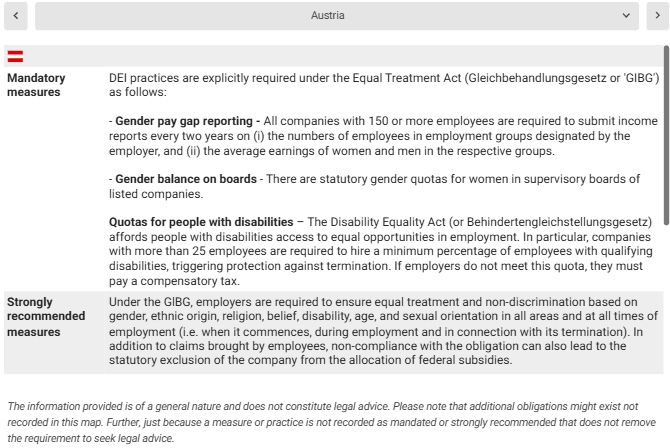Multinational employers with operations in both the US and
Europe are having to navigate the shifting position of the US on
diversity, equity and inclusion. To assist employers, we take a
look at what DEI measures are required by law or are strongly
recommended across Europe. This is an updated version of our
original article published on 4 February 2025, and includes an
updated map and new table of information.
Following the US Executive Order on ‘Ending Illegal
Discrimination and Restoring Merit-Based Opportunity’,
employers across Europe are receiving letters from the US
administration. They are being asked to effectively certify, within
five days, that they ‘do not operate any programs promoting DEI
that violate any applicable anti-discrimination laws’ in the
US.
To help employers respond to these letters, we have produced a
map and table below, setting out the legal position on DEI in
different European countries.
A map of mandatory DEI in Europe
The map below summarises the DEI measures that are required by
law in several European countries. It includes a number of issues,
including measures to promote gender equality; quotas and targets
for increasing the number of women on board positions; quotas and
targets for hiring people with disabilities; and other positive
action measures. The map does not include gender pay gap measures
on the basis that similar obligations already exist in US law.
Further details on these measures are, however, included in the
table below the map.
Which European countries have the most mandatory DEI
measures?
A map showing the number of DEI measures that are mandatory per
country, with the countries with more mandatory measures showing in
a darker colour. Click on each country for further details.
A more in-depth guide to European DEI
The table below provides further details on the mandatory
obligations in each country, as well as those that are strongly
recommended to avoid legal claims or the risk of legal claims
arising.
It should be noted that there is a core of anti-discrimination
laws in Europe that have been in place for many years, protecting
people with certain characteristics (age, race, gender, disability,
etc.). However, these are very well known and so we have not
enumerated these laws in the table. We also haven’t referenced
the specific obligation to make reasonable
adjustments/accommodations for disabled employees, which also
applies across Europe.
DEI in Europe: mandatory or strongly recommended
A table of the DEI measures and obligations across countries in
Europe that are either required by law, or are strongly recommended
to avoid the risks of legal claims arising.
Takeaway for Employers
The law in this area is nuanced and varies considerably across
the European continent. If you have received a letter from the US
authorities, or have more general queries or concerns about your
position as a business trading with the US, we recommend that you
contact us at [email protected] and we will put you in
touch with experts who can advise you.
The content of this article is intended to provide a general
guide to the subject matter. Specialist advice should be sought
about your specific circumstances.









